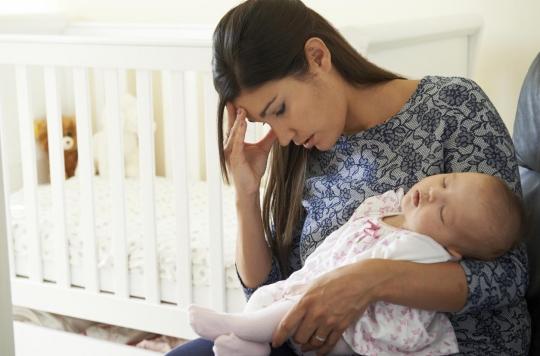Faced with the lack of information on the psychic and physical changes that accompany the onset of motherhood, the American psychiatrist Alexandra Sacks has developed the concept of matrescence, a word that contracts “maternity” and “adolescence”.

“The best mother in the world”, “no one can replace a mother”, “always ready to forgive, always the bravest”… Every year on the occasion of Mother’s Day, the latter are celebrated all over the world and the benefits of motherhood touted long, wide and across. But if becoming a mother is of course magical for billions of women, it is also an extremely disturbing physical and psychological transformation. Faced with the lack of explanations on the subject, Alexandra Sacksan American psychiatrist specializing in the support of pregnant women and young mothers, drew on anthropology to find a most reassuring word to designate this upheaval: matrescence, a contraction of “maternity” and “adolescence”.
“Do you remember when your body started to change in weird ways and everyone expected you to react in an adult way? It was adolescence. Those same changes happen to a woman who expecting a child and we don’t even have a word to define this process. We need it, “she began in a TED talk given a year ago.
“I received many calls from women telling me: “I just had a child and I’m worried, I’m not made for this, I don’t like it, do I postpartum depression?”, she recalls. “I list the symptoms and I realize that she does not suffer from depression but that does not reassure her. She is not supposed to feel like that, she assures. I then ask her: “what did you expect you?” “I expected motherhood to make me feel whole and fulfilled. I thought my maternal instincts would tell me what to do, I thought I would always want to put the baby first,” she replies.”
“Everything revolves between an attraction and rejection”
She continues: “I did not know how to help them because telling them that they were not sick did not help them to feel better. I wanted to find a way to normalize this transition (…). I did not find many things in medical books, I turned to anthropology and it took me two years to find a suitable word: matrescence. It is no coincidence that this word sounds like adolescence. These are two periods where hormones race. Like adolescence, it’s not a disease, so doctors don’t talk about it. That’s why it’s confused with a more serious affliction: postpartum depression.” .
With matrescence, “everything revolves between attraction and rejection”, explains Alexandra Sacks. Thanks to oxytocin, a hormone produced during birth, “the mother’s brain zooms, this hormone attracts her attention so that the baby is now the center of her world”, she develops. And if this process is vital for the child’s survival, “at the same time, her (mother’s) mind rejects this because the mother remembers that her identity has so many other components – other relationships, her job, her hobbies, a spiritual and intellectual life, not to mention her physical needs: sleeping, eating, exercising, having sex, going to the bathroom, alone”. “If these women knew that most other people find it hard , if they knew that ambivalence is normal, they would feel less alone and less stigmatized. There is nothing to be ashamed of”, assures the psychiatrist, encouraging all women to express themselves on the subject in order to break the taboo which surrounds it today.
Speaking out to reduce postpartum depression
Convinced that speaking out could help reduce the number of postpartum depressions, Alexendra Sacks continues to intervene in the media and has created numerous groups to bring young mothers to testify. She also co-wrote with Catherine Birndorf, director of the Motherhood Center in New York City, a book titled What No One Tells You: A Guide to Understanding Your Emotions from Pregnancy to Motherhood. “There are so many books out there on how to prepare the body and the baby but it’s also about your heart and your state of mind, it can go well and badly at the same time”, she explains to present his work in the American show Modern Motherhood.
Inspired by her work, the French sports journalist Clémentine Sarlat created the podcast a few months ago Matrescence which collects testimonials from mothers who have had a bad experience of breastfeeding or evokes the mental burden of new mothers. But this podcast isn’t just about women. It also targets young fathers with episodes titled Being a father without diving into toxic masculinity Where Can we learn to be parents.
Thus materescence should not be confused with postpartum depression, a postnatal psychiatric disorder that affects 10 to 15% of young mothers. Its diagnosis is based on the criteria of a major depressive episode, with the specificity of an onset of symptoms in the 4 or 6 weeks following childbirth (some mothers are however struck by the disease up to a year after birth). The most common symptoms are difficulty falling asleep, hyperactive behavior, difficulty concentrating, irritability, anxiety, permanent fatigue and impaired interaction with the child.
See below a televised intervention by Alexandra Sacks:
















